If you came to this story through social media, you’ve probably also read about the Annie Ee case, the ban mian auntie, or the group of Singaporean teen girls called Beaunite.
Less than a week ago, a K-pop group consisting of a bunch of Singaporean teens calling themselves Beaunite posted a video introducing themselves. Cue the flamethrowers.
While the original video was quickly deleted, the sound of hate continues to echo. The video was reposted for everyone’s consumption. Threads have been formed to flame them. Response videos have been made to roast them.

We know that the video wasn’t anywhere near the standard you’d expect from a professional K-pop group. And no, we don’t know what their motivations might have been; but even if the video was done in the name of fun, would it warrant the degree of flaming and shaming they received?
Why do keyboard warriors have no qualms in trolling these girls, many of whom would be secondary school kids? And not merely riding the wave of hate, but making money off their response videos? One hater (sorry, we won’t provide the link) has already clocked up more than a 100,000 views on YouTube; by our estimates, that could be worth more than $200 in ad revenue.
Profits from put-downs, dollars for damnation, gain off gripes. How many teenage spirits can you step on to gain fame and fortune?
It’s the dark and rude underbelly of the Internet – the comments section. This happens even on the most innocent of articles. In an interview with Madam Leong, aka ban mian auntie, netizens in the comments section were debating which “God” she was referring to. Needless to say, it spiralled into a whole name-calling fiasco.

Looking for the ugliest of Singaporean humanity? Search the Web.
It’s funny, because when I walk around town, take a bus or train, or eat at the hawker centre, most people seem to lead pretty undramatic lives. There’s no real evidence of this depth of hate. But you never know if the person beside you on his phone is posting yet another comment, throwing more kindling to the fiery pit of hate.
Take the Annie Ee case for example. An appropriate initial response – being appalled by the evilness of another man – somehow escalates into equally evil responses.
We are so happy to express anger.

There’s a strange power in anonymity. The fact that we’re hidden behind a computer screen and online alibi seems to have emboldened us to say things that we would never say in real life.
Anonymity seems to give people the freedom to reveal the true nature of our thoughts. It’s scary.
I’ve encountered it personally IRL. Some years back, after a camp I’d helped to plan, we put out an anonymous survey form for feedback.
The response that we got was disheartening. With the guarantee of anonymity, some of the respondents wrote the harshest words I’ve ever heard or read in such a setting.
I could’ve spent my time better somewhere else. Hated the games. One of the worst camps ever.
Would they have said those things if asked face to face? Most likely not, at least not in that manner. We definitely didn’t hear it from them in person.
It seems the Internet gives all our worst impulses just what they needed to thrive.
We’re so good at waging war. Now I wish we’d learn to wage peace.
If someone has a differing opinion or take on an issue from us in real life, we might feel frustrated. We might even have a robust argument about it. But we’d also see that person as another fellow human with valid human emotions and thoughts, instead of just an object for us to mock and scorn.
We seem to be able to hold more space for empathy and understanding face to face than on the Internet, where every comment box becomes a conquest, a battlefield where we have to take sides. Or a blanket party to join.
I once read on a blog that the “contentiousness for the sake of being contentious (is confusing). No great wars were fought over the virtue of fighting. No epic debates were waged in defence of argument.”
We seem to have lost all ability to empathise, to show mercy and to have compassion. We forget how to be kind. We spend hours and hours on the Internet waging war after war after war.
We’re so good at waging war. Now I wish we’d learn to wage peace.









